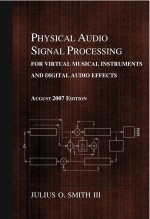
|
FreeComputerBooks.com
Links to Free Computer, Mathematics, Technical Books all over the World
|
|
- Title Physical Audio Signal Processing: for Musical Instruments and Audio Effects
- Author(s) Julius O. Smith III
- Publisher: W3K Publishing (December 21, 2010)
- Paperback 826 pages
- eBook HTML
- Language: English
- ASIN: B001V9CUDO
- ISBN-10: 0974560723
- ISBN-13: 978-0974560724
- Share This:

|
This book describes signal-processing models and methods that are used in constructing virtual musical instruments and audio effects. Specific topics considered include delay effects such as phasing, flanging, the Leslie effect, and artificial reverberation; virtual acoustic musical instruments such as guitars, pianos, bowed strings, woodwinds, and brasses; and various component technologies such as digital waveguide modeling, wave digital modeling, commuted synthesis, resonator factoring, feedback delay networks, digital interpolation, Doppler simulation, nonlinear elements, finite difference schemes, passive signal processing, and associated software.
This book was developed for the course "Signal Processing Models in Musical Acoustics". The course was created for graduate students in computer music and engineering interested in efficient computational modeling of musical instruments.
You should already understand digital signal processing, physics, and acoustics. Knowledge of the theory of algorithms and the basics of control theory wouldn't do you any harm either.
The goal of this book is to enable the reader in developing virtual musical instruments and audio effects that can be boiled down to algorithms and executed by a computer. One purpose of this book is how to avoid the computational expense associated with using general purpose differential equation solvers, such as finite difference schemes.
The book is also is about the art of determining the essential components of an acoustic instrument and taking advantage of data reduction inherent in human hearing in order to minimize computational expense. Did I mention that it is fun to read too? It's great when you can either see or - in this case - hear the result of your work.
About the Authors- Julius O. Smith III is a research engineer and musician devoted to developing new technologies for music. He teaches and supervises PhD research at CCRMA. He is formally a professor of music and (by courtesy) electrical engineering.
- Computer, Digital, and Mathematical Music

- Digital Signal Processing (DSP), Sound and Imaging Processing
- Physics
- Electronic and Computer Engineering

- Physical Audio Signal Processing: for Musical Instruments and Audio Effects (Julius O. Smith III)
- The Mirror Site (1) - HTML
- The Mirror Site (2) - PDF
-
 Introduction to Digital Filters: with Audio Applications (J. Smith III)
Introduction to Digital Filters: with Audio Applications (J. Smith III)
This book is a gentle introduction to digital filters, including mathematical theory, illustrative examples, some audio applications, and useful software starting points. Matlab programming examples are emphasized for illustrating the digital filters in practice.
-
 Spectral Audio Signal Processing (Julius O. Smith III)
Spectral Audio Signal Processing (Julius O. Smith III)
One can say that human hearing occurs in terms of spectral models. As a result, spectral models are especially useful in audio applications. This is the basis of modern audio compression techniques. The chapters are organized in a progression from basic spectrum analysis to more advanced frequency-domain signal processing.
-
 Discrete Fourier Transform (DFT): with Audio Applications
Discrete Fourier Transform (DFT): with Audio Applications
Detailed derivation of the Discrete Fourier Transform (DFT) and its associated mathematics, including elementary audio signal processing applications and matlab programming examples.
-
 O'Reilly® Web Audio API (Boris Smus)
O'Reilly® Web Audio API (Boris Smus)
Go beyond HTML5's Audio tag and boost the audio capabilities of your web application with the Web Audio API. Shows you how the Web Audio API solves specific application audio problems. You need little or no digital audio expertise to get started.
-
 The Haskell School of Music - From Signals to Symphonies
The Haskell School of Music - From Signals to Symphonies
This book explores the fundamentals of computer music and functional programming through the Haskell, inclues algorithmic music composition, such as stochastic generation, musical grammars, self-similarity, and real-time interactive systems, etc.
-
 Sonifying Processing: The Beads Tutorial (Evan X. Merz)
Sonifying Processing: The Beads Tutorial (Evan X. Merz)
This book introduces audio programming to Processing programmers through the Beads library. It covers topics such as synthesis, sampling and general sound-mangling in such a way that is appropriate for beginners, or more experienced programmers.





